Faculty Collaborate in Climate Change Events to Prepare for Health Risks
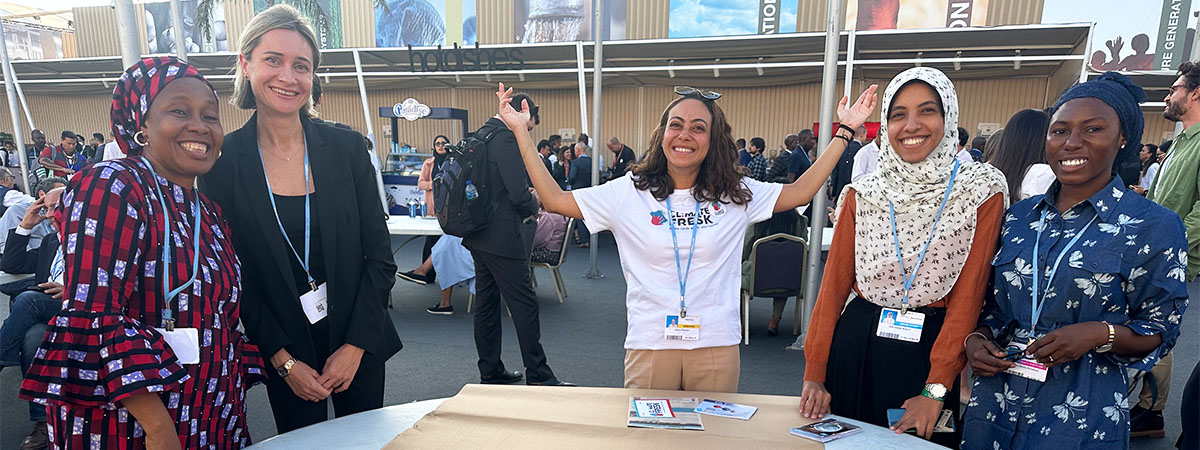
Climate change endangers the health of millions around the world, and in November our faculty attended several different events focused on climate change response. From the COP27 conference in Egypt, to a collaborative symposium with French environmental researchers, and a workshop on COVID lessons that apply to climate response, all these events cultivated partnerships that will help us respond to climate-driven health risks now and in the future.
Climate change is the single biggest threat facing humanity today. Already we see the impacts of climate change on health and wellness, here in the United States and around the globe. Dangerous heat endangers lives and health in many communities. Droughts, floods, and severe storms have displaced millions of people. And with each climate-related disaster, food insecurity increases for vulnerable populations.
As these climate-driven crises unfold, it is the communities with the fewest resources that suffer the most. Again and again, the most vulnerable communities endure the greatest hardship.
Public health must lead to prepare and respond to climate change, and we must be especially aware of the disparities in how these crises impact populations. Health equity must be a guiding principle in all we do.
To build our capacity and partnerships so that we can meet these emerging threats, our faculty participated in several recent events focused on climate-driven health risks.
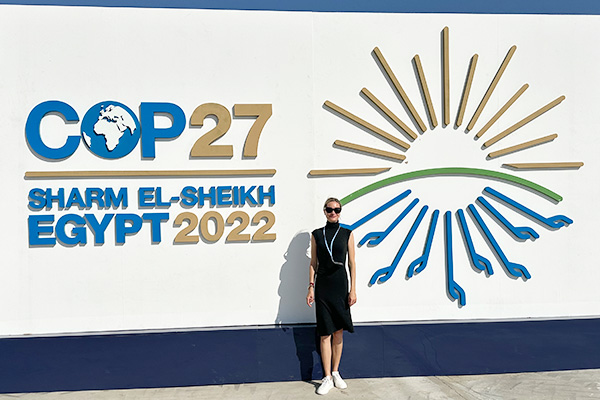
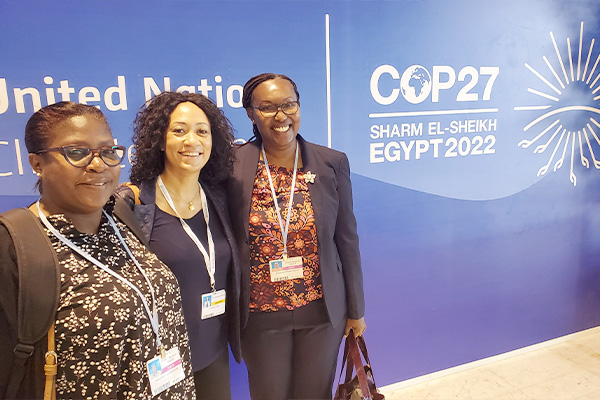
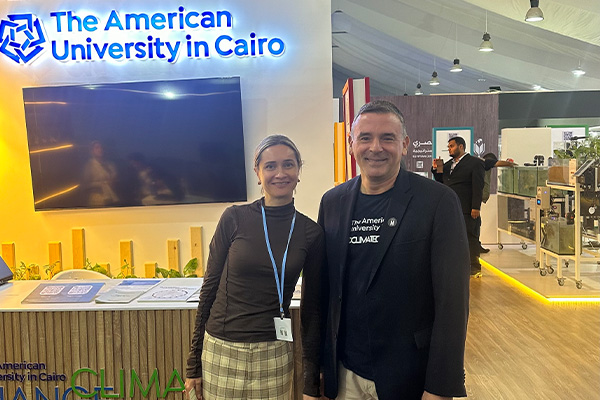
2022 United Nations Climate Change Conference: COP27
Two of our faculty, Yevheniia Varyvoda, PhD, and Aminata Kilungo, PhD, were able to attend two different weeks of the COP27 conference in Egypt this November. The 27th Conference of the Parties (COP27) to the United Nations Framework Convention on Climate Change, took place in the Egyptian coastal city of Sharm el-Sheikh, and concluded with a historic decision to establish and operationalize a loss and damage fund.
Dr. Varyvoda’s research focuses on environmentally sustainable solutions to build resilience for food systems. Dr. Kilungo’s research focuses on sustainable holistic approaches to water security, safety, and environmental health, including the prevention of waterborne diseases. Both researchers were able to connect with colleagues and hear from world leaders in climate change response. They bring all that they saw, heard, and learned back to MEZCOPH to support our climate change response education, programs, and research.
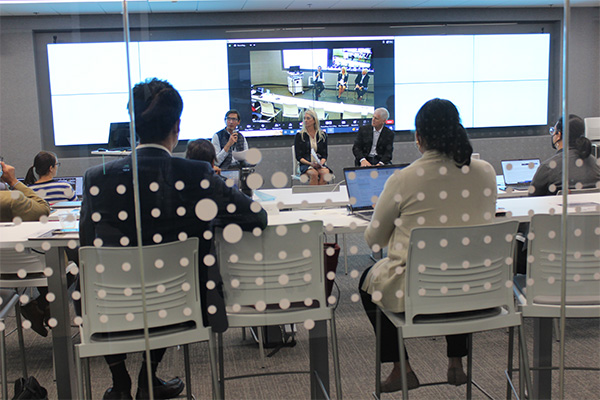
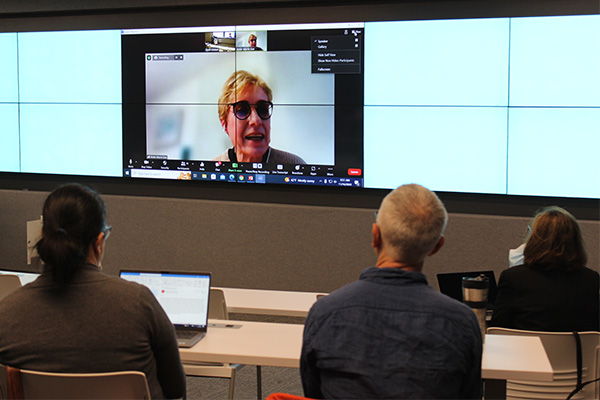
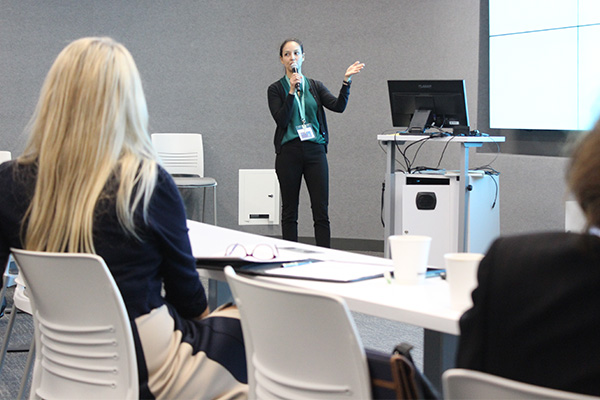
University of Arizona Collaborates with French Climate Researchers
A recent daylong meeting designed to build partnerships and collaboration with researchers from the French Centre national de la recherche scientifique (CNRS), was organized by the international research lab iGlobes, and the UArizona’s France-Arizona Institute for Global Grand Challenges, in the Office of Research, Innovation, and Impact. CNRS is equivalent to the National Science Foundation in the United States.
The meeting, titled Health and Environmental Change: Pushing Research Boundaries Through Arizona-France Cooperation, brought together French researchers with University of Arizona researchers who focus on climate change and health. Several MEZCOPH researchers presented and participated in the event, including Dean Iman Hakim who gave opening remarks, and Dr. Frank von Hippel, Dr. Melissa Furlong, Dr. Mona Arora, Dr. Chris Lim, Dr. Kacey Ernst and Dr. Kelly Reynolds. The lively discussions engaged researchers in areas of mutual interest, and illuminated opportunities for collaboration and funding with CNRS that the college will pursue.
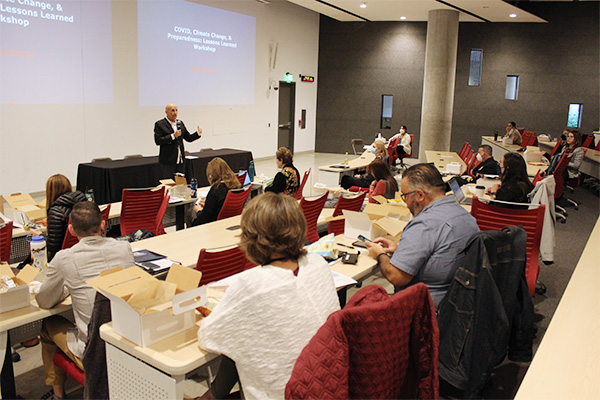
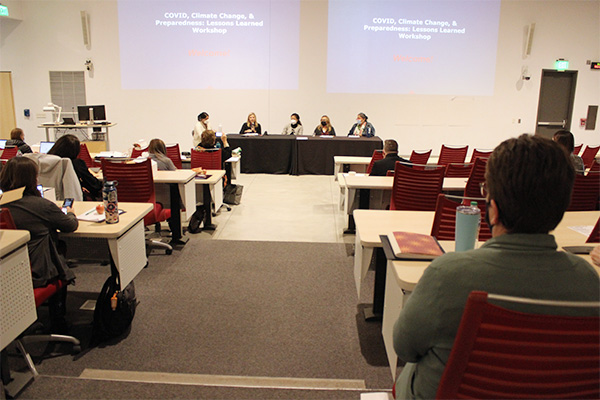
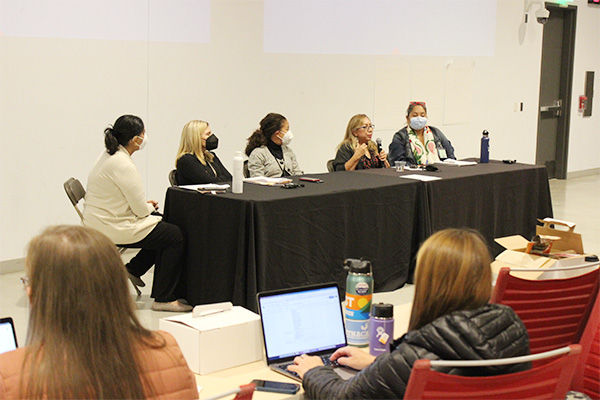
Workshop: COVID Lessons for Climate Change Response
A few days after the France-Arizona meeting, the daylong workshop COVID, Climate Change, and Preparedness: Lessons Learned, brought together researchers and students from around the University of Arizona to meet leaders from federal and regional agencies that worked on COVID response and see the emerging health threats from climate change.
Organized by our faculty Mona Arora, PhD, and Kacey Ernst, PhD, the workshop connected public health professionals and researchers to share what they learned from COVID response and apply those insights to find solutions for climate-driven health risks and challenges. Coordinated in collaboration with the UArizona’s Aegis Consortium, the Southwest Environmental Health Sciences Center, and the Center for Climate Adaptation Science and Solutions, the workshop highlighted the importance of using an interdisciplinary and community-based approach to climate threats.
Keynote speakers at the workshop included
- Aparna Bole, MD, FAAP, from the Office of Climate Change and Health Equity, US Department of Health and Human Services (HHS)
- Richard Carmona, MD, MPH, FACS, former Surgeon General of the US, Laureate Professor, Zuckerman College of Public Health, University of Arizona
- Commander Matthew Johns, MPH, Regional Health Administrator, Region 9, Federal Emergency Management Agency (FEMA)
- Julie Trtanj, MES, Climate and Heat Health Lead, US National Oceanic and Atmospheric Administration (NOAA) Climate Program Office
You can view the full workshop agenda, and the speaker and panelist bios. In addition, the workshop presentations and panels were recorded and will be available online.
Conference in India Confronts Public Health Threats from Climate Change
At a recent conference in India, Climate Change: A Public Health Threat, hosted by the Amrita Institute of Medical Sciences in Kochi, India, our researcher Heidi Brown, PhD, gave one of the opening presentations, Mitigating Climate Change Through Public Health Strategies.
Dr. Brown has expertise in managing the health risks of extreme heat, and she is a co-investigator on several climate change related grants including a BRACE grant for Arizona from the Centers for Disease Control (CDC), a recent UArizona climate change adaptation grant for CLIMAS from the US National Oceanic and Atmospheric Administration (NOAA) and a grant to prepare for extreme heat across Arizona from the US Department of Energy (DOE).
Mobilizing to Be Prepared
Climate change is a global threat to health, and it is already impacting health and wellness for many communities in the Southwest. To respond effectively, we must collaborate across fields, agencies, and communities. All of these recent climate change events bring together experts and researchers in partnership to prepare for climate-driven crises.
We know that climate change disproportionally harms the most vulnerable populations. In response, we must prioritize health equity as we plan, implement, and deliver services to communities in need. Our faculty in the Zuckerman College of Public Health are taking the lead to meet the range of health challenges that climate change presents. We will work with communities here in Arizona and around the world to build knowledge, programs, and resilience as our world warms.

